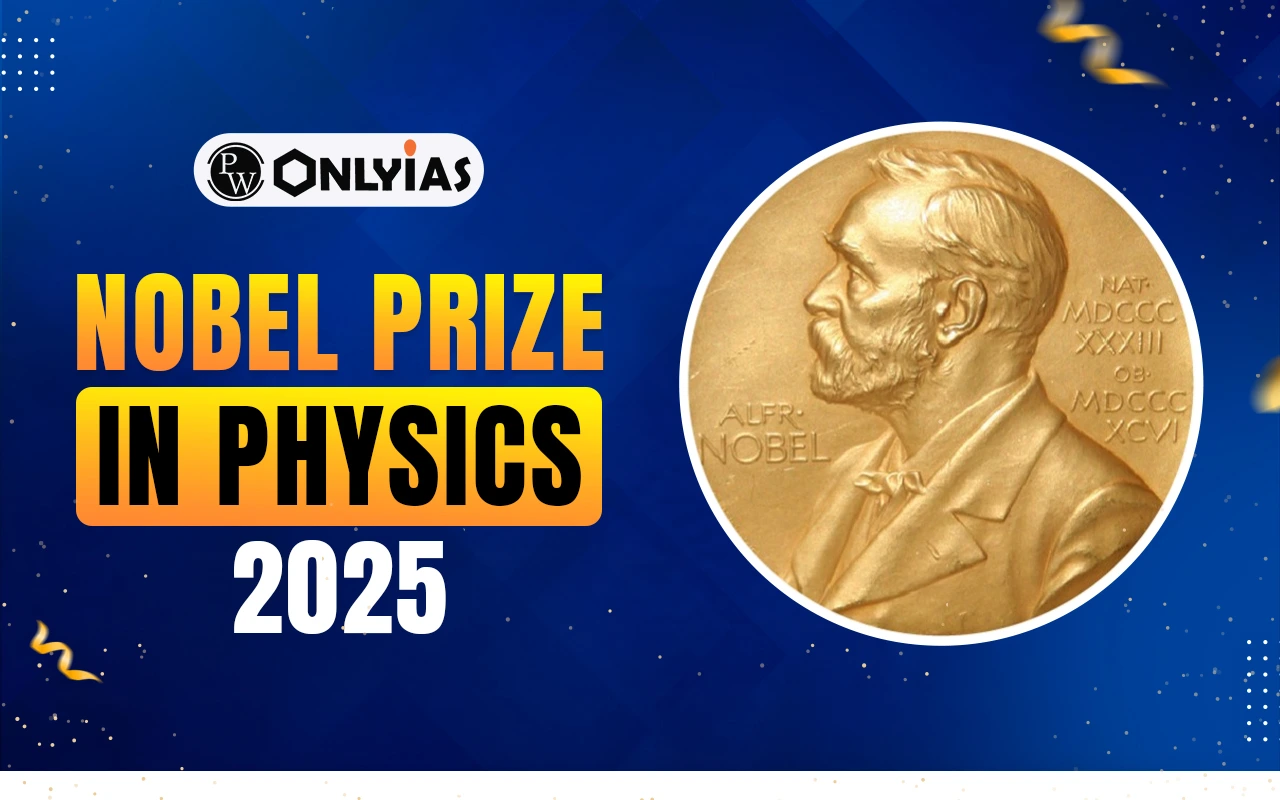Nobel Prize in Physics 2025 has been awarded to John Clarke, Michel H. Devoret, and John M.Martinis on October 7, 2025. They have been awarded the Nobel Prize for their work on the discovery of macroscopic quantum mechanical tunnelling and energy quantisation in an electric circuit.

Nobel Prize in Physics 2025: The Nobel Prize is one of the most prestigious awards in the world. It is presented to those personalities who make great contributions in the field of science, literature, peace, and economics. The Nobel Prize in Physics 2025 was awarded to the trio of John Clarke, Michale H. Devoret, and John M.Martinis for their work on the discovery of macroscopic quantum mechanical tunnelling and energy quantisation in an electric circuit.
Nobel Prize in Physics honours groundbreaking achievements in areas such as quantum mechanics, relativity, particle physics, cosmology, optics, and material science, among others.
Nobel Prize in Physics was announced at the Royal Swedish Academy of Sciences in Stockholm on October 7, 2025. It was awarded to the trio of John Clarke, Michel H. Devoret, and John M.Martinis. They had worked extensively towards the discovery of macroscopic quantum mechanical tunnelling and energy quantisation in an electric circuit. Here is an overview of the Nobel Prize in Physics 2025:
| Nobel Prize in Physics 2025 Overview | |
| Particulars | Details |
| Focus of the Award | outstanding contributions to mankind in the field of physics |
| Winners | John Clarke, Michel H. Devoret, and John M. Martinis |
| Awarding Body | Royal Swedish Academy of Sciences |
| Key Discovery | discovery of macroscopic quantum mechanical tunnelling and energy quantisation in an electric circuit |
| Significance of the Discovery | It shows that quantum mechanics can be manifest in everyday-sized electrical systems. |
| Prize Amount | 11 million Swedish kronor, to be shared equally among the three laureates |
It is essential to keep in mind that the Nobel Committee keeps the names of nominees confidential for 50 years. This rule helps to maintain fairness and independence throughout the process of selecting Nobel Prize winners. Every year, thousands of nominations are submitted by scientists and academic institutions around the world. Only a few are shortlisted by the Nobel Assembly. However, the list of nominees is not disclosed.
The Nobel Committee found the contribution and the work of the three scientists, John Clarke, Michel H. Devoret, and John M.Martinis, to be a great discovery in the field of physical science and electromagnetism. The collective research of the three scientists has led to the discovery of macroscopic quantum mechanical tunnelling and energy quantisation in an electric circuit.
Their groundbreaking experiments demonstrated quantum phenomena in a macroscopic system, moving quantum effects from the subatomic realm to a scale large enough to be held in the hand. It shows that quantum mechanics can be manifest in everyday-sized electrical systems.
The Nobel Prize in Physics 2025 winners list includes the following three distinguished scientists:
The first Nobel Prize in Physics was awarded in 1901 to Wilhelm Röntgen of Germany. He discovered X-rays, which are still being used to diagnose bone fractures, locate embedded bullets, and more. His discovery revolutionised diagnostic medicine and marked the beginning of modern physics.
To prove his findings, Röntgen had famously used his wife’s hand to create the first human radiograph. The image showed the bones and her wedding ring, clearly demonstrating the medical potential of the new rays. Röntgen called them “X-rays,” with “X” representing the unknown.
The Nobel Prize was established by Alfred Nobel, a Swedish inventor, in 1895. He left a will stating that money from his fortune should be given to people who make the world better. Over the years, several Indians have been honoured with the Nobel Prize for their contribution. It was C.V. Raman who got first Nobel Prize in Physics in India. Other Winners of the Nobel Prize in Physics from India are as follows:
| List of Nobel Prize Winners in Physics in India | ||
| Winner | Year | Contribution |
| C.V. Raman | 1930 | Discovered the Raman Effect |
| Subrahmanyan Chandrasekhar | 1983 | Studied stars and stellar evolution |
Here is an overview of the Nobel Prize in Physics Winners over the last five years. Each discovery marks a step forward in modern physics.
| Nobel Prize Winners in Physics Last 5 Years | ||
| Year | Winners | Contribution |
| 2025 | John Clarke, Michel H. Devoret, and John M.Martinis | discovery of macroscopic quantum mechanical tunnelling and energy quantisation in an electric circuit |
| 2024 | John J. Hopfield and Geoffrey Hinton | for foundational discoveries and inventions that enable machine learning with artificial neural networks |
| 2023 | Pierre Agostini, Ferenc Krausz and Anne L’Huillier | for experimental methods that generate attosecond pulses of light for the study of electron dynamics in matter |
| 2022 | Alain Aspect, John Clauser and Anton Zeilinger | for experiments with entangled photons, establishing the violation of Bell inequalities and pioneering quantum information science |
| 2021 | Syukuro Manabe and Klaus Hasselmann | for groundbreaking contributions to our understanding of complex physical systems |
Ready to boost your UPSC 2026 preparation? Join PW’s UPSC online courses today!
Nobel Prize in Physics 2025 was awarded to John Clarke, Michel H. Devoret, and John M. Martinis for their discovery of macroscopic quantum mechanical tunnelling and energy quantisation in an electric circuit.
It was announced on October 7, 2025, at the Royal Swedish Academy of Sciences in Stockholm.
The discovery shows that quantum mechanics can be observed in everyday-sized electrical systems, bridging the gap between microscopic and macroscopic quantum effects.
The total prize amount is 11 million Swedish kronor, shared equally among the three winners.
The first Nobel Prize in Physics was awarded in 1901 to Wilhelm Röntgen for discovering X-rays, which revolutionised medical diagnostics and modern physics.
<div class="new-fform">
</div>
